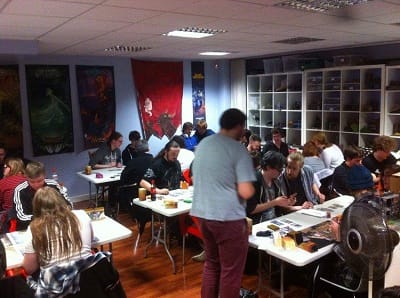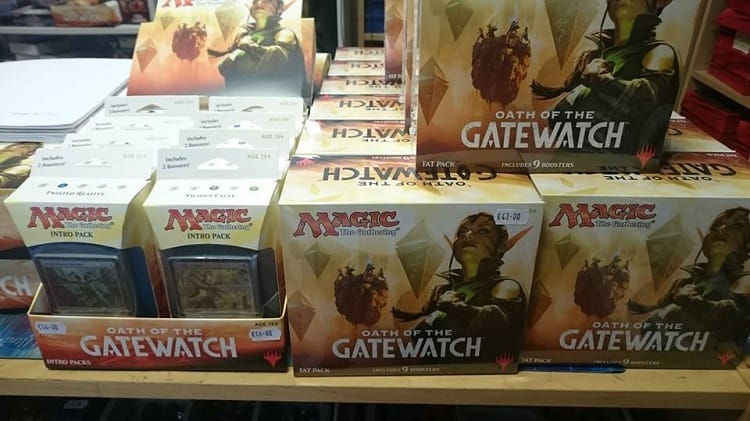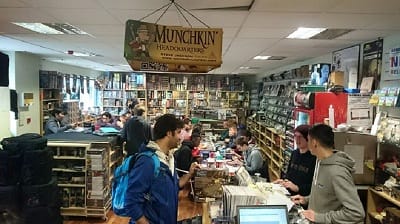What’s the best way to tell area residents about plans for a new asylum shelter nearby?
The government should tell communities directly about plans for new asylum shelters, some activists and politicians say.
Since its launch in 1992, Magic: The Gathering has become the most-played trading card game in the world. What’s it all about?

It’s midnight on a Friday in the back room of Gamers World on Jervis Street. The doors are shut to the public. A judge shouts over the chatter of about 30 gaming enthusiasts: “Magic players, you have 45 minutes!” Things are about to get real.
Since its release in 1992, Magic: The Gathering, or simply Magic, has become the world’s most-played trading card game. As of 2016, there are about 20 million players worldwide, duelling in eleven languages.
And I’m about to engage in my first ever competitive Magic: The Gathering duel.
In short, the lore of the game involves wizards called planeswalkers who cast spells on each other and try to slash their opponents’ 20 life-points to zero. There are countless forums dedicated to dissecting the storylines which accompany each and every Magic release, and the game boasts its own Wiki, and its own subreddit.
Here in Dublin, there are hundreds of Magic players, and Gamers World – which sells all things gaming-related that don’t involve computers – is something of a hub.

The gaming business did well in the recession, as the economic decline pushed people back into their homes. Unable to go out as much, they began seeking cheaper ways of entertaining themselves. Board games are, some say, enjoying a renaissance.
At Gamers World, most of the games are fantasy-themed, with armies or magical creatures killing each other. Initially, I thought most of the games would be adult-oriented. But they’re not.
An hour of rummaging through products reveals just one title that is not child-friendly: a game called Monopoly, which seems to openly promote and reward sociopathic behaviour.
Magic is the most popular game people play inside Gamers World. There are more than 300 names on Gamers World’s system registered to play in tournaments, a weekly league, and official nights put on by Wizards of the Coast, which is the owner of Magic.
And now my name graces the list. In order to play, I’ve had to register officially. My number is 9314624369.
A few times a year, Wizards of the Coast releases new cards, and official distributors can hold preview tournament nights, when fans get a sneak peak of the latest release.
The cards we’re using to play tonight aren’t officially on sale until next week; my Eldrazi Aggresor, Umara Entangler, and Oath of Chandra aren’t available for public consumption just yet.
Before tonight’s festivities, Dave Glennon, an 18-year Magic veteran, showed me the ropes, breaking out two starter decks in a quiet corner. Glennon has a beard, and works for a gaming company. He shakes my hand and smiles.
“Oh, you’ll get the hang of it easily enough,” he says, ” but it takes years and years to master.”
Glennon says he’s here at Gamers World a few times a week. Each day of his life, by the sound of it, involves some kind of gaming.
The rules to Magic are simple at first, but become increasingly complex as one becomes more adept.
Half of a deck usually consists of what are called “land” cards, which can be used to summon monsters and cast spells that damage an opponent. The other half are the monsters and spells themselves.

Each player begins the game by drawing seven cards. If they don’t like their hand, they can “mulligan”, and shuffle it back into the deck, and then draw six. If those six are not to their taste, they can do the same again, drawing five, and so on, until they like what they’re holding.
After that, they’ve got to use a combination of strategy, cunning and luck to try and beat their opponent. Magic is like a mixture of poker and chess; it requires bluffing, knowledge of how every piece works, and also a bit of luck.
However, unlike in poker, in Magic pure luck will get you nowhere against an experienced player. You could just draw a royal flush in a game of Texas Hold ‘Em and win.
But it doesn’t work like that in Magic. You must know how and when to use a good hand, which takes years of playing. Or so they say.
Right now the shop is filled with about thirty Magic enthusiasts, all of whom have been eagerly awaiting this latest release, the Oath of the Gatewatch series of cards.
So that everyone can become accustomed to them, tonight’s contest will only involve spells and monsters from this latest batch of cards.
For a €30 fee, everyone gets the new cards, and a night of Magic.
As everyone who has registered to play begins to sit down, we are given six “booster” packs. We then use the cards to builds decks for tonight’s matches.
The artwork on the cards is really beautiful, and incredibly detailed. I find myself distracted by the intricacy of the illustrations of monsters and spells and creatures and elves, warlocks and griffs and pixies and imps.
“A lot of the artists hired to do the artwork are some of the best in the world, and have worked for people like Marvel and DC,” Glennon says, as he and the others prepare my deck for me.
Although I am a fan of the artwork on Gravity Negator, Grip of the Roil and Blinding Drone, and am cautiously optimistic that they will protect my precious life-points this evening, my favourite card is Shambling Ghoul. I can relate to him.
The cards come in a variety of colours, each of which is for a different style of play: black involves players damaging themselves to do even greater damage to their opponent; red, an extremely aggressive style of play; blue is “logic”, a more laid back style; white is for a defensive strategy; green involves casting spells to increase the power of a player’s monsters, or ‘bulking’.
Glennon usually uses red, taking out his opponent quickly.
A running gag among Magic aficionados is that it’s “like cardboard crack”. I can see this.
The game now has its own micro-economy. Some of the rarest cards can sell for thousands of dollars on the internet.
One player tells me he once spent €190 on a single card, and was subsequently almost dumped by his girlfriend. With greatness comes sacrifice.
“That foil card you have there, that’s worth about five quid,” Glennon says, pointing at one of the land cards I’ve taken from a booster.
Often, at nights like this, the rare cards you get can more than cover the cost of entry.
“The deck I have on me now, it’s probably worth about €800,” Glennon says.
Glennon says he doesn’t worry about his valuable cards being stolen or damaged. As it turns out, the esoteric nature of Magic provides some measure of protection for a player’s financial investment; it is difficult for thieves to profit from stolen cards.
“We’re really the only place in Dublin where you could sell them,” he says, “and we’ll know if a deck has been reported missing. So, we can just say, ‘Give us the cards, we’ll see how much they’re worth, come back in a half-hour,’ if someone comes in with a stolen deck trying to sell it, and then call the guards.”
Glennon began to play Magic competitively in 2009,when he returned home after living in Barcelona. He hasn’t looked back. He’s won several tournaments, and he helps organise events.
He is frequently here in Gamers World, defeating whoever sits in front of him. Glennon has a reputation for surprising opponents.
“Typically, people will go online and look up decks that win games, and then try and build them themselves,” he says. “I don’t do that, I prefer for people to not know what’s coming.”
I notice that many of the cards that Glennon has are in foreign languages – Japanese and something called Phyrexian, an in-game language that seems to be incomprehensible. That doesn’t really matter, he says, because players of his pedigree know the function of each and every card in circulation, whether they can read the text on it or not.
This kind of expertise means that Magic games between experienced players can transcend language barriers. “We do get cases where people who don’t speak English come in for tournaments, and play with everyone,” Glennon says.
It’s theoretically possible for a player who speaks only English to face off against an opponent who speaks only Phyrexian.
Some of the players tonight are worried that the article I tell them I’m writing will be some kind of hachet job.
They say that the underlying message in much of the journalism about Magic is basically, “Look at these nerds.” And yet here I am – they’ve allowed me to come along anyway, and they’re friendly and welcoming.

In August 2014, the Irish Independent independent.ie/irish-news/niamh-horan-on-women-in-rugby-i-never-play-a-game-without-my-tan-30495836.html”>ran a
piece in which a reporter was sent to play a few games of rugby with the Irish women’s team. The message of the piece was essentially, “Don’t worry guys, they’re actually totally normal women, I swear.”
Some of the Twitterati responded by saying that the writer shouldn’t have focused on normality, and normative notions of femininity, and correcting stereotypes, because by doing so she was legitimising that kind of criteria for judging people.
This informs the conflict I now feel, because there is a stereotype that exists about Magic players: that they’re anti-social losers, hiding away from the real world.
And having been welcomed here, and met everyone, and had such a good time, I now find myself torn between wanting to tell the reader just how “normal” and “nice” everyone really is, and not wanting to legitimise the stereotype by engaging with it.
As far as official tournaments go, tonight is a relatively quiet affair.
There will be between 70 and 100 people in Gamers World tomorrow, and the same on Sunday, all duking it out over tabletops. Some of the people here have even played Magic professionally: the game has a pro circuit, and those who take part in international tours can win up to $40,000.
Official pro tournaments typically take place four times a year, and players from all over the world participate. Although there is a significant Magic community in Dublin, there aren’t enough players to justify lucrative tournaments. So Irish Magic players must travel abroad for cash prizes.
“It takes a lot of dedication to play at that level,” Fergus Looney, the manager of Gamers World, had told me a few weeks previously. “Those guys are dedicating probably the equivalent of a job [in terms of hours played] to play at that level.”
With a great deal of assistance, my deck is finally built. Now that everyone has settled down, a list of names stuck to the wall reveals my first official opponent: Oli Bird.
It turns out that Bird actually has a job with Wizards of the Coast. Or, as others at the tournament put it, he “works for the mothership”.
He’s a bit of a big deal: he is Ireland’s top Magic judge, and a level three, which means there are about 130 people in the world who can judge the game at his level. The judging tiers goes up to level five, but there are even fewer of those guys.
Being that good pays. Next week, Bird is going to Mexico City to oversee an official tournament. After that, it’s on to Atlanta for more of the same. “It’s essentially a paid holiday,” says Bird.
He has been playing since 1994. I don’t stand a chance against him.
It Begins
We draw seven cards each. Mine looks good to me: I draw a big huge flaming thing that can do six damage.
I look to Bird, and ask him if he’s ready to go. He squints a little, then shakes his head.
He’s unhappy with his cards. He mulligans, returning the seven to his deck, shuffling and drawing another six. He’s happy this time. We get going.
As we sit and play, we chat.
“Next week, I’ll be at a grand prix, which usually involves three to four hundred players,” Bird says. “I’m coordinating, which means that you have to be good with people. It involves a lot of management skills.”
There are other benefits to being a Magic judge at this level, says Bird. “A lot of the skills I’ve gotten from doing these events have really helped me in my full-time job” – he’s a software tester – “and it’s fun.”
One of the judges is hovering nearby, looking over my shoulder. He notices a card I’ve drawn: Deceiver of Form.
“Try and use that one,” he says. “It’s absolutely class.”
The monster on the card looks like a worm with spikes, and does eight damage. Solid, but it matters not. The gap between casual and elite player is staggering, and my precious life-points and I soon plummet into the vast chasm that lies between newbie and pro.
I lose all three of our games. “Commiserations,” Bird says, as he shakes my hand and leaves in search of his next opponent.
Despite my loss, Magic, it turns out, is a lot of fun.
After round one, people go out for smokes, or to grab a Red Bull. As luck would have it, my next opponent is Glennon. The student hath returned to fight the master.
It turns out that Glennon might have been taking it easy on me earlier. This time, very move I make, every attack I attempt, is met with a devastating response. It feels like playing your older brother at Top Trumps. My life-points begin to dwindle.
I ask him how he got so good, and what makes a good player.
“Be a nice person,” he says. “If you’re an asshole, no one will practise with you, no one will want to give you feedback on your decks or play style, and no one will want to even just chat between rounds. It makes tournaments a very lonely place, especially ’cause of how close people within the community get.”
It is easy to see how it would be uncomfortable here for a player nobody likes. Right now, the community of players is tight. Everyone seems to be friends. For want of a better term, this is a safe space.
“There are definitely people out there that people don’t want to play against ’cause they’re sore losers and when they go on tilt they become pricks, or they won’t accept they messed up,” Glennon says.
To be good, you should also be willing to change what’s in your deck, Glennon says.
“Some folks will take a list from online and play it to death, but be unwilling to change cards in it cause it’s not ‘what the pros do’,” he says. “But their local scene and local meta-game, what other people are playing, might be quite different from what the pros are facing.”
I ask him if there are people who perhaps take the game too seriously.
“I don’t think you can take it too seriously,” he says. “When you take the game seriously you play every event you can for practice, read articles, watch videos and streams – but you can do all that and still know how to be a nice guy with a bit of banter at a tournament.”
Throughout the discussion, as we chat, Dave wins every game.
Game over. Glennon, having defeated me, heads towards the list, to get his next match.
As the night stretches into morning, and towards the 5am mark, two more opponents waltz over and beat me.
One is a 10-year veteran and the other, a two-year veteran. Their stories are similar to everyone else’s here: they played Magic once or twice at a friend’s house, and now, years later, they’re still hooked.
The night is over. The sun soon to rise, everyone is exhausted, but ready to come back later today.
“I’ll be playing Magic straight through ’til Sunday evening,” Glennon says. “Tomorrow [later, on Saturday], the fun really starts.”
I leave with my new cards in hand, happy in defeat. I might just be back for another taste of cardboard crack.
Get our latest headlines in one of them, and recommendations for things to do in Dublin in the other.